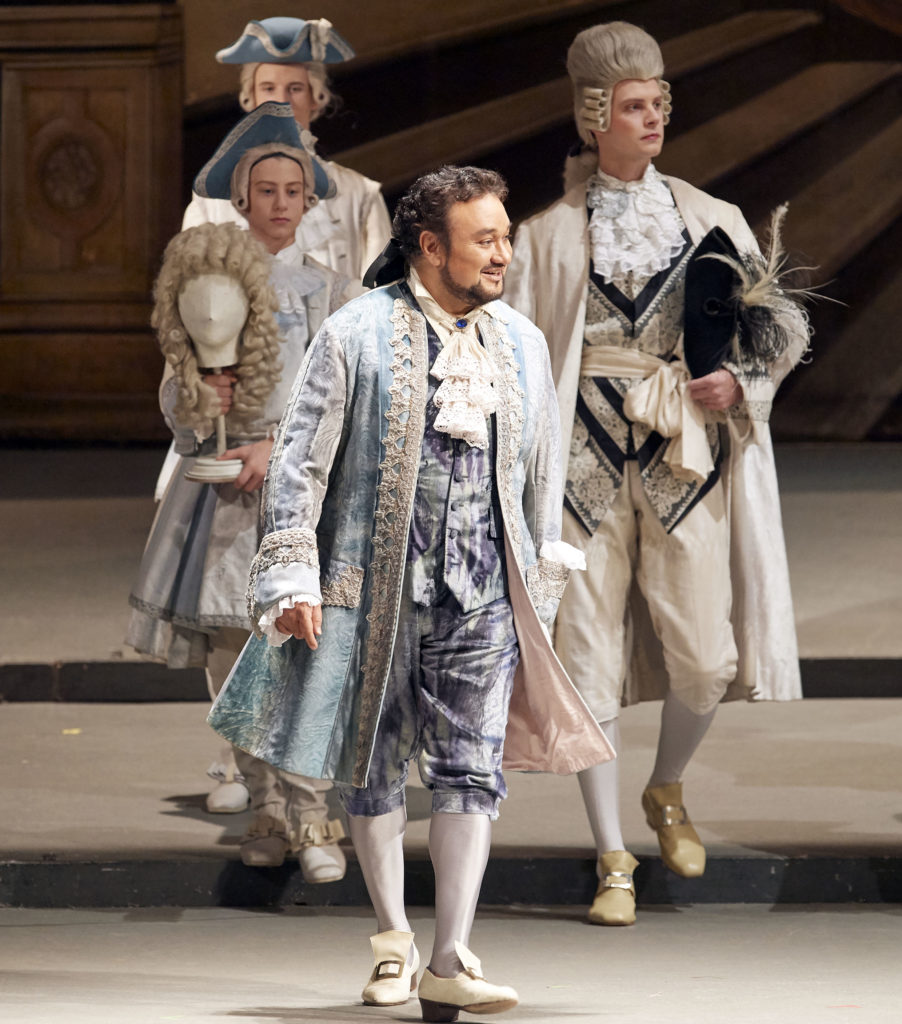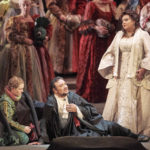 Verdi’s Un ballo in maschera at Vienna State Opera. Still Gianfranco de Boiso’s ‘historic’ production with the trompe d’oeuil painted sets, perhaps mustier than when I saw them in 2016. But they’re in the spirit of the 18th century Swedish court.
Verdi’s Un ballo in maschera at Vienna State Opera. Still Gianfranco de Boiso’s ‘historic’ production with the trompe d’oeuil painted sets, perhaps mustier than when I saw them in 2016. But they’re in the spirit of the 18th century Swedish court.
Actually those sets I reviled are more interesting than I’d thought. The stage (Emanuele Luzzato) is done like a baroque theatre: a stage-within-a stage, with draped curtains either side. Within, screens and walls are skillfully painted to give the illusion of galleries, with actual pillars, and, back of stage, huge vistas. This illusionist, ‘mannerist’ art is appropriate for the court of Gustav III and for a masked ball where everything is not as it appears.
But the costumes (Santuzza Cali) are for real, extravagant and authentic: the courtiers lavishly dressed in cream silks, detailed in lace, in Act 1, when the chorus sing awaiting the King (Pose in pace). Ramon Vargas’s Gustav III is granting petitions (in this 18th century of Enlightenment, he’s a benevolent monarch.) ‘Power is good when it strives for joy and dries tears,’ he sings. He is ‘a good man’, but in the tragedy, a victim of his own weakness. He covets the wife of his friend and loyal secretary, Count Ankarström (sung by Roberto Frontali.)
In his aria – his private thoughts behind the public mask – Vargas’s lyrical tenor sings with great feeling. He thinks of nothing but Amelia: when will she beguile his heart to see her again. In the dramatic irony, he’s approached by Ankarström, his most loyal servant. Robert Frontali’s baritone is authoritative, plumbing splendidly rich depths, warning his life is in danger. The love of the people protects him, God is on his side, sings Gustav. Ankaström replies, in the aria Alla vita che t’arride, on your life so many depend, but will the love of the people always protect you from danger?
The King is supposed to banish the soothsayer Ulrica, but he’s intrigued after his page – the petite, exquisite soprano Maria Nazarova – sings a moving ballad. He will visit Ulrica, disguised as a fisherman, to have his fortune told.
 The gypsy Ulrica, described as black, is actually sung by a black singer. Hurrah! Bongiwe Nakani made a strong impression, swathed in a burgundy and gold robe. Verdi’s gypsy figures – like Azecuna in Il trovatore– are sympathetic, social outcasts. Ulrica sings possessed by the devil Re dell’abisso: I feel his embrace. Nakano’s mezzo is mesmerising. For the sailor, Christian – the immensely tall, impressive baritone Igor Onishchenko – she predicts promotion and gold.
The gypsy Ulrica, described as black, is actually sung by a black singer. Hurrah! Bongiwe Nakani made a strong impression, swathed in a burgundy and gold robe. Verdi’s gypsy figures – like Azecuna in Il trovatore– are sympathetic, social outcasts. Ulrica sings possessed by the devil Re dell’abisso: I feel his embrace. Nakano’s mezzo is mesmerising. For the sailor, Christian – the immensely tall, impressive baritone Igor Onishchenko – she predicts promotion and gold.
She’s also petitioned in private by Amelia, who seeks a secret potion to counter her uncontrollable feelings of love for Gustav; and the guilt she feels. Elena Pankratova, brunette, an immense stage presence, with an angel’s voice, is a soprano with with breathtaking power. Lord give me strength to placate my heart and find peace. But when she hears him sigh, she must follow him into the abyss! Magnificent!
The King himself disguised- Vargas sings a sea shanty – wants her to prophesy his future: ‘it will not harm us’, he sings (ironically.) Ulrica, thunders, he who challenges his fate will pay the price! Oh! ill-fated man. Ask me no more. But he boasts, he’d be happy to die on a field of honour. – No, you will die by the hand of a friend . – Is this prophesy, a joke or madness? E’ scherzo od è follia? Then, recognising the King, he who saved her from banishment, (and now tips her), ‘You are kind-hearted, but surrounded by traitors, she prophesies.
Act 3 opens in a graveyard, where Amelia has been sent to look for a herb ‘beneath the gallows’. (This may seem hocus pocus, but Verdi’s 19th century was rife with superstition.) Anyway, cause for a terrific aria. Amelia sings of this terrible place: her heart freezes. Though she may die here, she must do it. What is left to me ? Misere de Jesu. Then the King arrives (having eavesdropped on her meeting Ulrica).
Their duet is a high point. At least save my name! She belongs to another, who would give her heart to you. – (Vargas) If he stays away his heart will cease to beat. He sings of many sleepless nights: Heaven help me! He’d give his life for a word: I love you. – Yes, I love you, protect me from my heart! – Vargas and Pankratova are splendid together, a duo made in operatic heaven.
In the dramatic irony Ankarström approaches to warn of plotters; the King escapes in Ankarström’s cloak; and they, Ankarström and Amelia, are threatened at knife point. Amelia is now unveiled. Ankarström had an assignation with his wife! they scorn him, in one of Verdi’s great choruses, like mocking laughter.
Ankarström, shattered- deceived by both wife and friend- Frontali is outstanding in his aria. Seguitemi- Mio Dio!: This is how the traitor rewards the loyalty of friend. He sings of the memory of Amelia in his arms. All is past, nothing in his heart but hate. Love lost, lost hopes! Now he wants to be in on the conspirators’ plot. Revenge wins, sung to plucked strings, Ve’, se’ di notte; then with chorus, a rousing pledge of loyalty, a summons to battle.
 Your tears won’t suffice : be silent adulteress! Amelia’s aria pleading for a last chance to see her son is a high-point of the opera, one of Verdi’s greatest. Opening with a cello solo, Kill me, but grant me one last request, let me see my son. Pankratova crosses her arms as if to cradle him. If you don’t grant this for a wife, grant this wish for a mother, Pankratova, harrowing, her piercing high notes appealing to the heavens. If she must die, then let her son close the eyes of the mother, who will never see him again. Tremendous top notes. Chilling. The audience were wildly enthusiastic, but isn’t there something crass about applauding such tenderness?
Your tears won’t suffice : be silent adulteress! Amelia’s aria pleading for a last chance to see her son is a high-point of the opera, one of Verdi’s greatest. Opening with a cello solo, Kill me, but grant me one last request, let me see my son. Pankratova crosses her arms as if to cradle him. If you don’t grant this for a wife, grant this wish for a mother, Pankratova, harrowing, her piercing high notes appealing to the heavens. If she must die, then let her son close the eyes of the mother, who will never see him again. Tremendous top notes. Chilling. The audience were wildly enthusiastic, but isn’t there something crass about applauding such tenderness?
Amelia witnesses the plotters: feels something terrible will happen. She has to draw the name of the King’s assassin. Ankaström. Fate is just! They both go to the masked ball. As so often in Verdi, the private drama is hidden beneath the public celebration.
‘Let us live and dance’ has echoes of the revelers ball in La Traviata preceding Violetta’s tragic death. The irony is that, prior to the Ball, The King in his study resolved to give up Amelia and send her and Ankarström home safely. In his aria, ‘Let the sea separate us’.
But the King, ‘kindled by her beauty, will see her once again. Vargas’ King is suitably wearing black, with a red patch, like a heart: Pankratova’s Amelia in white, Frontali and the conspirators in green. Undercover of the masque, fancy dress blurring reality and illusion, the stabbing is swift and sudden.
Vargas, maybe not the most powerful tenor, but one of the most sincere and poignant. Mortally wounded, the King forgives Ankaström: he insists Amelia is ‘untarnished’, but will never forget her. Still the minuet plays on insistently, reverting finally to Verdi’s melancholy opening theme. The opera has some of Verdi’s greatest music. This cast was exemplary, Giampaole Bisanti elicited wonderful playing from Vienna State Opera Orchestra, whose chorus are invariably excellent in Verdi.
And Vienna’s stage sets notwithstanding, the costumes are spectacular, splendid, brilliantly colourful, lavishly designed. Each one worth a fortune in fabrics and skill. No wonder they’re not changing the production! © PR. 1.11.2018
Photos: Ramon Vargas (Gustaf 111); Boningwe Nakani (Ulrica); Elena Pankratova (Amelia); Maria Nazarova (Oscar), Ramon Vargas (Gustaf III), Elena Pankratova (Amelia); Featured image: Ramon Vargas (Gustaf)
© Wiener Staatsoper/ Michael Pöhn
viennaoperareview.com
Vienna's English opera blog
